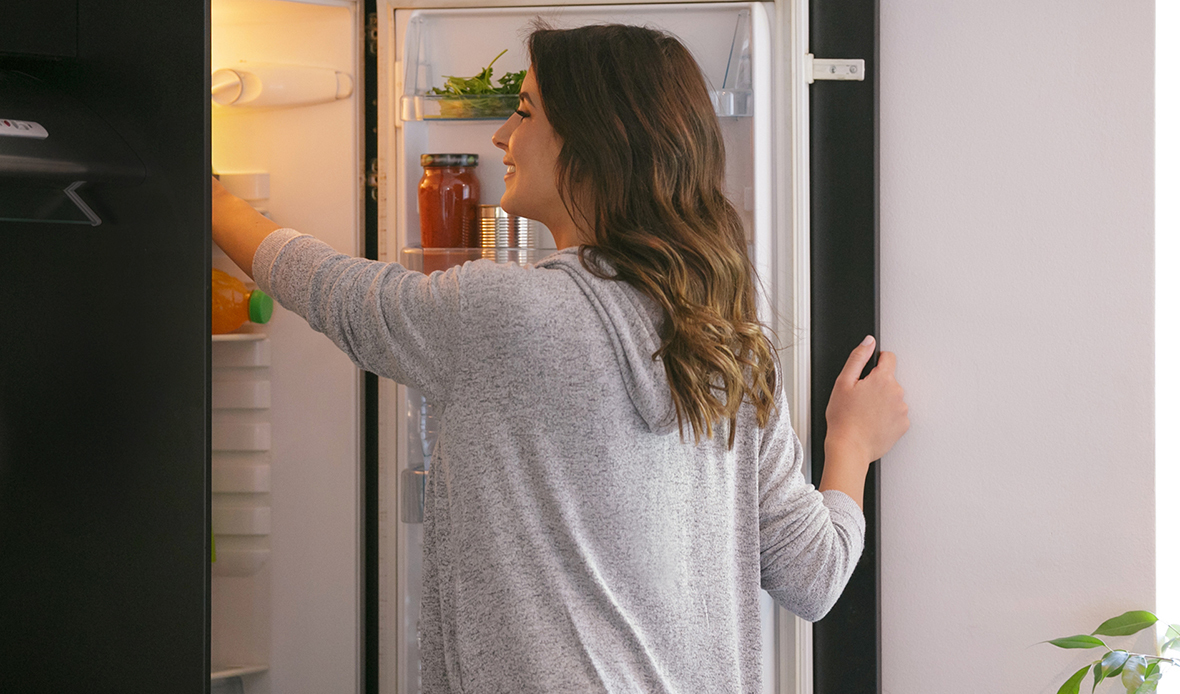
If you’ve ever dug into a package of cookies or mixed up a batch of mac ‘n cheese to soothe your state of mind, you’ve experienced emotional eating. It’s a human thing that dates back to when our species migrated across the plains, hunting and gathering. Back then, big emotions like fear of predators and anxiety about how to survive winter drove us to stock up on calories because food sources might not be there tomorrow.
Modern life also has big emotions of fear and anxiety. But these days, rich, high-calorie foods are as near as the pantry. And we don’t move nearly enough to make up for the surplus calories.1 The result: Too many calories—often empty ones—leads to weight gain. That leads to more discouraged feelings—and more emotional eating.
It’s a dangerous cycle, but it doesn’t have to get the best of you. MOBE Guides offer these tips around psychology and nutrition to help break the pattern.
Simply notice.
Being mindful of when and what you eat can start to help you notice your own patterns. Does eating your comfort foods calm or cheer you? Do they help you recover from a tough day? Try recording them in a diary. “Mindful eating isn’t only being mindful of our choices but being mindful of our thought process around eating,” says MOBE Guide Alessandra. Simply knowing how and when overeating happens for you makes it easier to resist the impulse next time.2
Be a friend to yourself.
The practice of self-compassion can be a powerful way to short-circuit emotional eating. Talk silently to yourself as if you were a caring friend, accepting and simply curious about the stresses that cause cravings and mindless eating. Research validates that this warm acceptance is more effective than sheer willpower.3
Walk for five minutes.
Emotional eaters have an easier time managing their triggers if they spend time moving their bodies. It’s a double-whammy effect: Exercise is a great emotional regulator, which helps put the brakes on emotional eating. At the same time, physical activity helps you manage your weight.4
Take away temptation.
When you know which foods are your trouble spots, keep them out of your home. And, if you are having strong feelings like anger or sadness, delay your shopping trip. Wait until you’re feeling more level-headed.
Engage your brain.
Boredom can be a trigger for emotional eating. Find activities that require creativity, imagination, social interaction, or physical movement. Put together a puzzle, call a friend, or volunteer at a food pantry. And remember, screen time can trigger boredom eating for many, so put down the electronics.5
Find a feel-good substitute.
Recognize your pattern and catch the moment you ‘give yourself a break with bad food.’ Find a substitute that feels good or better and savor it instead. Call a friend, enjoy a funny video, or walk outside. The emotional connection to food can be complex and hard to resolve. Talking about it with a supportive friend or even a professional can lead to lasting success.
Above all, remember the 80:20 rule.
Eating well 80 percent of the time can make up for the 20 percent of the time you slip up. Go easy on yourself and gently get back on track whenever you notice your eating is linked to your feelings.6
Work on your nutrition goals with one-to-one support from a MOBE Guide. Get started today.
References:
1. American Council on Exercise. What’s Eating Your Clients? Five Proven Strategies for Overcoming Emotional Eating. https://www.acefitness.org/certifiednewsarticle/2582/what-s-eating-your-clients-five-proven-strategies-for-overcoming-emotional-eating/
2. Harvard Health. Struggling with emotional eating? https://www.health.harvard.edu/diet-and-weight-loss/struggling-with-emotional-eating
3. Kelly, A. C., & Carter, J. C. (2015). Self-compassion training for binge eating disorder: A pilot randomized controlled trial. Psychology & Psychotherapy: Theory, Research & Practice, 88(3), 285–303. https://doi-org.mclibrary.idm.oclc.org/10.1111/papt.12044
4. Frayn, M., Livshits, S., & Knäuper, B. (2018). Emotional eating and weight regulation: a qualitative study of compensatory behaviors and concerns. Journal of eating disorders, 6, 23. https://doi.org/10.1186/s40337-018-0210-6
5. Crockett, A. C., Myhre, S. K., & Rokke, P. D. (2015). Boredom proneness and emotion regulation predict emotional eating. Journal of Health Psychology, 20(5), 670–680. https://doi.org/10.1177/1359105315573439
6. Mayo Clinic. Weight loss: Gain control of emotional eating. https://www.mayoclinic.org/healthy-lifestyle/weight-loss/in-depth/weight-loss/art-20047342